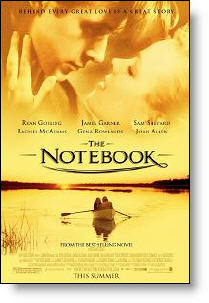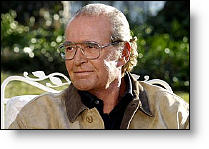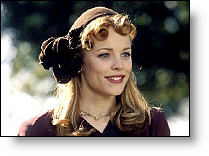Interview with Producers Mark Johnson and Lynn Harris, Writer Jeremy Leven, Actors James Garner and Ryan Gosling of “The Notebook” (2004)
by Chris Monroe
Staff Writer

See our REVIEW of “The Notebook”
The varied backgrounds of the people who made the film “The Notebook” helped initiate varied philosophical ideas that the story addresses, mainly with the idea of enduring love. While it was inescapable to deny that it exists, seeing just how it applies to our lives proved more of a mystery and stirred up meaningful discussion on the topic.
Ryan Gosling
Up and coming actor, Ryan Gosling (“The Believer,” “The United States of Leland”) discusses his perception of the film and its love story. He says:
For me I sort of felt like it was kind of a fairytale.but an interesting one. I don’t know of anybody who has had a romance quite like this, but I certainly know people who have stuck it out.I tried to find something real in essentially something that’s science fiction or something—for me anyways—not having an experience like this.

James Garner
Contrastingly, at seventy-six years old, actor James Garner discusses his experience with love and marriage. He tells why he believes in enduring love.
I believe in it because I’ve been married for forty-eight years to the same woman. I think the main thing about people and husbands and wives, they have to give the other person respect—their feelings and what they want. I’ve always tried to not do anything that would embarrass my wife, and she does the same.I think it’s just respect for the other person. And after you live with somebody for a while, that love has grown into something else other than that physical urge; it’s grown into companionship and those things.
What Noah and Allie had was that enduring kind of love, and it consumed him. It was his whole life after she got Alzheimer’s.his whole life went waiting for her, and then when he found her and have lost her to Alzheimer’s—that’s tough. But he stayed with her and loved her. It’s just a beautiful story.
When asked how he sees the movie compared to Ryan Gosling’s comment about it being a kind of fairy tale, Garner responded, “I don’t see it as that. I see it as true to life, and mainly because of the Alzheimer’s.
Discussing his most dramatic scene in the movie, Garner explains his approach:
I went in there, I did the scene, and I reacted to her [Gena Rowlands]. I didn’t know what I was going to do. Had no idea how far they wanted to go with it. I just reacted to her. I think what you saw was probably a lot of the first take, because I kind of went there myself. Well, kind of? I did go.
Maybe some actors plan all that. I don’t have any idea.I just waited for her and reacted to her.
Garner, who’s been in the acting business for about fifty years, divulged more about his overall philosophy on acting in relation to this scene.
I never thought of myself as an actor. I’m a reactor. I can’t just get up there and chew scenery all by myself. I mean, a lot of actors can. They can go on for an hour or two.I just react to what is put in front of me or I hear, and sometimes that’s easy and sometimes that’s not. But that scene was easy going into it and hard getting out of it. But I was pleased with the scene. I just saw it the other night. I don’t like to see me on film, but that went all right.
Garner agrees that he is thankful his career has blossomed the way it has, and harkens back to how he first began.
I’m surprised, tickled to death, that at seventy-six years old I’m still working—and enjoying it.I got very lucky at twenty-five years old to get into a job that I really liked. It took me two and a half years to really like it, because about a year and a half or so after I started.I met my wife. We got married.she had a child from a previous marriage who was in the hospital with polio. So it gave me great determination to succeed. And I didn’t have that before. I didn’t care.
Jeremy Leven
Writer Jeremy Leven (“The Legend of Bagger Vance”) doesn’t know if the idea of “faith” is a hard sell in screenplays these days, but admits that it’s part of all of his work. He explains:
My novels, the first one’s “Creator,” about faith. The second one is about the devil coming for psychotherapy because he feels he is unloved and misunderstood. That’s all about faith. At the end.the devil has destroyed the life of the psychiatrist—absolutely destroyed it. He’s lost everything: his children, his home, his job, his wife, everything. And he’s off to do it again, and the devil says, “I don’t get this. Hope. Hope. Hope. He’s off doing it again. Where does this ever come from?”
So all my novels, a lot of my screenplays, they all deal with basically love and faith and religion, a lot.
Reminded of a line he wrote in this movie where James Garner’s character tells a doctor, “Science only goes so far, then there’s God,” Leven reacts:
I’m glad they left that in there. That’s me. I’m glad I got it in. Actually, in everything that I write.I always have a cryptic in there that my kids know about. I have “704” because “7” is “G,” “0” is “O” and “4” is “D.” So there’s always a phone number with 704 or and address with 704 or something in every book that I write. Every screenplay that I always write, there’s always 704 in it somewhere. And the name of my company is “Creator.”
Leven describes his biggest challenge in adapting Nicholas Spark’s novel into a screenplay.
The biggest challenge is to make it real, not to make it saccrine. There’s a slight of hand while you’re pulling the audience’s strings not to let them know, so they don’t feel like you’re pulling their strings. It’s a very difficult thing to do and it’s a very delicate line between it, to make sure that it’s real. You still get them to cry at the end, but they’re crying over something that’s real. It’s not hard to get an audience to cry, but to get them to cry because it resonates with them—that’s hard.
Mark Johnson
The time spent with producers Mark Johnson and Lynn Harris proved to be one of the most interesting in terms of discussing the love story and what it could mean for each of us individually. Mark gave his gut reaction to the film:
At the end of the day, it’s an old-fashioned love story—and hopefully in the best sense of that. It posits a love that every last one of us—women and men—want, and hope that we have and aspire to. This isn’t about a love affair that had this great moment, this moment of passion, then things came apart. This is a love affair that endured, and went on every single day. And what we see with James Garner—this is a man who is wooing his wife anew every single day. And he did that when he was a teenager and.who wouldn’t want to be loved like that and for that amount of time? One of the most emotional scenes for me is when he’s there with her kids and they say, “Come on home.” And he says, “This is my home. She is my home.”
Lynn Harris
Tackling the question as to whether or not they see this film as true to life or as a fairy tale, Lynn Harris expresses her take on it:
It’s not unlike, in some ways, the conversations we had in development where Mark would say, “But this guy doesn’t exist. There’s no one who’s as good as Noah.” And I kept saying, “Yes, there is.” [laughs]
At this, Mark Johnson interjected and said, “We hope that man exists, we hope that woman exists. I think we do believe.” Harris continued: What’s interesting about that comment is that I think we probably sort of split the difference, because I think we probably agree with both of them to a certain extent. It is a little bit of a fairy tale and it is a little bit of a fantasy of what a romance should be. But at the same time there is a real weight to that kind of dedication in romance and I believe it does exist. So I think you can have both and they can coexist.
From a Christian standpoint, it is easy to draw a parallel between this love and the kind of love God has for us. Probing further I asked them why they think we, as people, respond to these kinds of stories so strongly. Harris responded:
Everybody wants to believe that. You want to believe that somebody could love you that much, could have that much dedication could have that kind of faith in the bond that connects people. I think that it’s why as difficult and, as sort of few and far between as these kinds of movies are—when they work, they work really well because they hit that heartstring in everybody. You can be as cynical as you want in the times that we live in, but everybody wants to believe in real love.
The exciting thing about this topic is that that perfect Man and that perfect, enduring, everlasting love does exist in Jesus Christ. The relationship between Noah and Allie and the pure love that is expressed throughout this film highlights this kind of romance each of us can have personally with our loving Creator.
Nick Cassavetes
Son of mogul film director John Cassavetes and actress Gena Rowlands (who stars in this film), Nick Cassavetes talked about the love expressed in his film.
People ask me, “Why did you make this movie?” And I say, even though it hasn’t been my experience, it’s the kind of love I believe in. It’s not “cool” and it’s not “current,” but we have to be honest with ourselves when expressing ourselves. And at the end of the day, I was reading this script, and I was emotional, and at the same time my mind was working on many levels. I was thinking, “This is not the type of movie that I would be attracted to. Why am I going to do this movie?” And I think upon further explanation it’s because I believe in it. And as a director, it’s your responsibility to have a point of view. And my love that I believe in is big and waxy and gigantic and beautiful and endless. It doesn’t stop.
I also asked Nick Cassavetes what it is about this film that causes us to react to it so strongly. He said:
I think that what it is, is it parallels a great commonality of people. We all get old. We all die. The strange complication of being a human being is we’re not a completely insulated being. We need the touch of a man or a woman, as the case may be, to feel complete with our lives. That is a very difficult load, because when you love someone, you can’t just love part of them, you have to love them all. And you have to take the bad with the good.I believe in love that doesn’t stop.
I love somebody, I have a very, very, very hard time not loving them. We’ve all broken up with girls and boys and it’s a devastating process for me personally, but if we do that, and we stay steady, what’s the final result? Seventy-five years from now, none of our futures are very bright. And that’s the shared human experience.and if I’m right, it becomes apparent in this movie. No matter how hard you love, the best you can hope for is winding up in bed with somebody you love and going out together.
Going further, I asked if this kind of love could also transcend our human experience. Cassavetes paused, and then replied,
“That’s a good question. Ah, yeah, I do. I mean, of course you do. My father’s dead and I love him as much as when he was here.”
Having received some flack already for telling this kind of larger-than-life love story, Nick exposes his ideas about making movies:
The best thing that you can do as a filmmaker is make a movie where people hate and love it. If everybody kind of says, “Yeah, it was kinda good.”—ooh, that’s not so good. I’ve had people attack me in this movie and just say, “That would never happen.” Then I think, well, you know, must have touched a nerve.
He also explained:
You can shoot arrows at this movie if you want, and a lot of people will.If I was honest, I would admit that that possibility exists, and it’s out there. Maybe we’re disappointed that it’s not happening the way we hoped it would happen right now, but that’s the beautiful thing about hope and faith. If it’s out there and it’s meant to come, then it’s gonna come.
Nick also tended to questions about the sexual content in the movie:
I’m a prude. I’m modest. I don’t believe in exposing people’s private parts. It’s not even so much a moral thing for me, as I get embarrassed. That’s the way I am. But the complication is that sexuality is not the totality between man and woman, but it’s certainly a big part of it. And you have to show it. There’s a carnality that’s involved.
This version is toned down in steaminess than it was originally to get a PG-13 rating. I don’t want children seeing things they shouldn’t be seeing. I wanted the excitement of the sexuality between them, but certainly, we don’t do no dirty stuff.
Nick Cassavetes graciously finished his interview by telling of his biggest challenge in doing this project:
I’d say the most challenging part of the project is.I don’t really put too many goals on myself on a film, except for trying to keep it real. I wanted the film—if I had any expectation on the film—to be an reflection of how I feel about love. Just for that, I feel successful. The hardest thing was just keeping your mental focus to making sure that always, always, always you were trying to create something that had some kind of connection with reality.
James Marsden
I asked actor James Marsden if he saw his character, Lon, as the “bad guy.” He said:
No. No. That’s why I loved the character.People do unexplainable things when they’re in love. Nick [Cassavetes] and I made a plan from the get-go: let’s make this guy [Lon] as likeable as possible, and she [Allie] chooses whomever she chooses. The point of it is there’s no logic.
There’s that linear line of thinking that just doesn’t come into play when you’re in love with somebody or you’re feeling that feeling. Yes, I’m the guy she’s supposed to be with for many reasons, but that’s not how it ends up.
The test of time that the characters went through to the very end.proved that whatever was driving her then to make that decision was the right one—whether she could explain it or not.
Explaining further, James Marsden says:
I think what it’s saying is you can have everything lined up according to the book, the formula of what every girl wants.and it can still not be right. And you can put it past all the people going, “What’s wrong with you?” and the person themselves can’t even explain it to them.
Whatever that feeling is when you’re in love with somebody—and it’s not lust or like knee-jerk love at first sight or whatever—there’s this tangible connection and it can transcend any of that logic. And I think that’s what the movie is.People say that’s not realistic, but I think it’s great, also, that we got away from that cliché.because that would make it less interesting. And I think by making her decision a more difficult decision it validates Noah and Allie’s love for one another.
As with Nick Cassavetes, I asked James Marsden if he thinks this kind of love transcends our human, Earthly existence. He said:
I believe it has to. That’s just me wanting to believe that. It’s very difficult when you’re surrounded by a world of practical realities. But you have to believe that when you feel.what a soul is. How can you hold a soul in your hand? You can’t, but you know that it exists and that transcends any sort of tangible, touching, living thing. So, I believe that you love with your soul. And I’m sure that when they say soul mates.[with] Allie and Noah in this movie, there’s a soul connection. And that that would transcend any sort of vessel that we live in temporarily.

Rachel McAdams
Actress Rachel McAdams summed up her impressions and what drew her to the project, saying,
“It’s just a grand love story.because that’s just about one of the most important things—to me anyway. Honestly, I think if you can find a good love that will last that long, you’ve got the key.”
Read our REVIEW of “The Notebook”